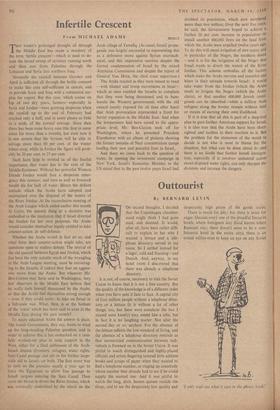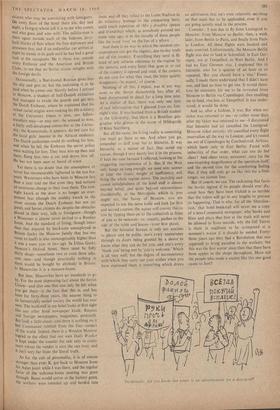Outtourist
By BERNARD LEVIN ON second thoughts, I decided that the Copenhagen chamber- maid might think I had gone mad, and desisted. It would, after all, have been rather diffi- cult to explain to her why I wanted a lettuce and a tele- phone directory served in my room. So I settled instead for a lager, cold and foaming—and Danish. And, anyway, in my hotel room I discovered that there was already a telephone directory.
It is not, of course, necessary to visit the Soviet Union to know that it is not a free country. But the quality of the knowledge is of a different order when you have seen it face to face. A capital city of four million people without a telephone direc- tory or a lettuce (it is without a lot of other things, too, but these were somehow the two I missed most keenly) may sound like a joke, but in fact it is no laughing matter. Not after the second day or so, anyhow. For the absence of the lettuce reflects the low standard of living, and the absence of a telephone directory reminds us that unrestricted communication between indi- viduals is frowned on in the Soviet Union. It was pitiful to watch distinguished and highly-placed officials and artists fingering tattered little address books and scraps of paper when they wanted to find a telephone number, or ringing up somebody whose number they already had to see if he could supply the wanted one. And it was pitiful to watch the long, drab, beaten queues outside the shops, and to see the desperately low quality and desperately high prices of the goods inside.
There is much for pity; but there is more for anger. Outside every one of the dreadful Intourist hotels, where foreigners stay (God knows where Russians stay; there doesn't seem to be a non- Intourist hotel in the entire city), there is an armed militia-man to keep an eye on any Soviet
'I only lead out what it says in the phrase book.'
citizens who may be associating with foreigners. On every floor of the hotel there sits, day and night, a Gorgon whose job it is to see who comes and who goes, and who with. The militia-man is there again outside each of the hideous, jerry- built blocks of flats where the free diplomats and pressmen live, and if an unfamiliar car arrives at night he stands in its path until he has had a good look at the occupants. He is there, too, outside every Embassy and the American and British Clubs, to see that no Soviet citizen mingles with the foreign devils.
Occasionally, a fleet-footed Russian gives him the slip and gets in; but the reckoning is to be Paid when he comes out. Shortly before I arrived in Moscow, a student of half-Danish extraction had 'managed to evade the guards and get into the Dutch Embassy, where he explained that his mixed racial, origins were making his life a misery at the University (there is also, our fellow- travellers may—or may not—be amused to note. a fairly well-developed colour-bar at the Univer- sity; the Komsomols, it appears, do not care for the local girls' interest in the African students). The Dutch authorities could do nothing for him, and when he left the Embassy the secret police were waiting for him. They beat him up then and there, flung him into a car and drove him off. He has not been seen or heard of since.
Yet there is no doubt that the atmosphere of terror has immeasurably lightened in the last few years. Westerners-who have been in Moscow less than a year told me that even they had noticed an enormous change in their time there. The mid- night knock at the door is no longer an ever- present fear (though the midday knock in the street outside the Dutch Embassy has not yet gone), and Soviet citizens do, despite the obstacles Placed in their way, talk to foreigners—though a Westerner is almost never invited to a Russian home. And the standard of living, though lower than that enjoyed by hard-core unemployed in Britain (lucky the Moscow family that has one room to itself) is also unrecognisably higher than it Was a mere year or two ago. In Ulitsa Gorki. Moscow's Oxford Street, there must be fully thirty shops—sometimes two or even three adja- cent ones—and though practically nothing in them would be bought by anybody in Britain. to Muscovites it is a treasure-house.
But then, Muscovites have no standards to go by For the most depressing fact about the Soviet Union—and also one that can only be felt when You get there—is the fact that this is, and has been for forty-three years, the nearest thing to an hermetically-sealed society the world has ever seen. The bookstall in my hotel looks at first sight like any other hotel newspaper kiosk; Russian and foreign newspapers, magazines, postcards. But look a little closer, and there is nothing on it but Communist rubbish from the four corners of the world. Indeed, there is a Western Moscow legend to the effect that our own Daily Worker is kept under the counter for sale only to custo- mers whom the vendor is sure she can trust, and it isn't very far from the literal truth.
As for the cult of personality, it is of course stronger than ever. K. got back to Moscow from his Asian jaunt while I was there, and the regular farce of the welcome-home meeting was gone through. Buses would arrive at the factory gates, the workers were rounded up and herded into them, and off they rolled to the Lenin Stadium to do voluntary homage to the conquering hero, amid much repetition of 'Mir y druzhba' (peace and friendship) which, as somebody pointed out some time ago, is in the mouths of these people like the word 'love' on the lips of a whore.
And there is no way in which the resident cor- respondents can get the regular, day-to-day truth out of the country. Everything they send is fil- leted of any adverse reference to the regime by the censors, and every letter that goes in or out of the country is opened and read; if the censors do not care for what they read, the letter quietly disappears—'in transit,' of course.
Nothing of all this. I repeat, was in any way news to me. Soviet dictatorship has, after all, been documented in detail for a long time now. As a matter of fact. there was only one item of real information that I gleaned from my fort- night's stay. It was learned from a British student at the University; that there is a Brazilian geo- grapher who glories in the name of Hildegarde O'Riley Sternberg.
But all the same, the living reality is something you .must go there to see. And when you go, remember to doff your hat to Intourist. It was Intourist, as a matter of fact, that saved my reason, though I very nearly lost it in the process. It kept me sane because I reflected, looking at the staggering incompetence of it, that if the West only hangs on long enough. we must win; sooner or later the titanic weight of inefficiency will bring the whole regime down. The incivility and casual unhelpfulness of the hotel staff is almost beyond belief, and quite beyond remonstrance (incidentally, at the Metropole, which is, you might- say, the Savoy of Moscow, you are expected to use the same knife and fork for first and second courses; the waiter will convey this to you by tipping them on to the tablecloth in front of you as he removes—or, usually, pushes to the side of the table and leaves—your first plate).
But the Intourist bureau is only too anxious to please and be polite, one's every appearance through its doors being greeted by a desire to know what they can do for you, and one's every 'thank you' being met by 'you're welcome.' Which is all very well; but the degree of incompetence with'which they carry out your wishes when you have expressed them is something which draws an admiration that isn't even reluctant; anything on that scale has to be applauded, even if you are going quietly mad in the process.
Consider: I was due to fly from Leningrad to Moscow; from Moscow to Berlin; then, a week later, from Berlin to Paris, and finally from Paris to London. All these flights were booked and seats reserved. Unfortunately, the Moscow-Berlin flight was due to land at Schonfeld, in East Ger- many, not at Tempelhof, in West Berlin. And I had no East German visa. I explained this to Intourist, who for a quarter of an hour or so repeated, 'But you should have a visa.' Event- ually, I made them understand that I didn't have one, and had no time to get one. It would there- fore be necessary for me to be re-routed from Moscow to Berlin via Copenhagen, thus enabling me to land, visa-less, at Tempelhof. It was under- stood; it would be done.
And so, after a fashion, it was. But when my ticket was returned to me—or rather some days after my ticket was returned to me-1 discovered that Intourist had (a) cancelled the Leningrad- Moscow ticket entirely; (h) cancelled every flight reservation all the way to London; and (c) routed me out of Copenhagen by Czechoslovak Airlines, which lands only in East Berlin. Faced with imbecility of that order, what can one do but cheer? And cheer twice, moreover; once for the awe-inspiring magnificence of the operation itself, and the second time for the comforting feeling that, if they will only go on like this for a little longer, we cannot lose.
But of course, we can. The reckoning that faces the Soviet regime if its people should ever dis- cover how they have been tricked is so terrible that the rulers will go to any lengths to prevent its happening. That is why, for all the 'liberalisa- tion,' that hotel bookstall will never see a copy of a non-Communist newspaper, why books and films and plays that hint at the truth will never be allowed in from outside, why the full Terror is there in readiness to be re-imposed at a moment's notice if it should be needed. Forty- three years ago they had a Revolution that was supposed to bring paradise to the workers; but this was the first winter since then that there have been apples in the shops throughout. Have not the people who made a society like this one good cause to fear?
'Incidentally. cud yon knalv Hurt runrs an advertisement for a detergent?'



































 Previous page
Previous page